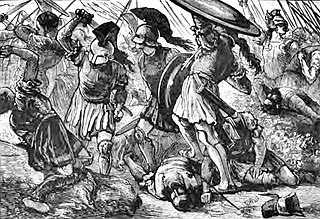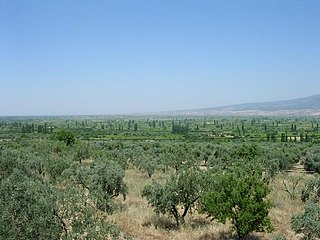 W
WThe Battle of Chaeronea was fought in 338 BC, near the city of Chaeronea in Boeotia, between the Macedonians led by Philip II of Macedon and an alliance of some of the Greek city-states led by Athens and Thebes. The battle was the culmination of Philip's final campaigns in 339–338 BC and resulted in a decisive victory for the Macedonians.
 W
WThe Battle of Corupedium, also called Corupedion or Curupedion was the last battle between the Diadochi, the rival successors to Alexander the Great. It was fought in 281 BC between the armies of Lysimachus and Seleucus I Nicator. Lysimachus had ruled Thrace for decades and parts of western Asia Minor (Turkey) ever since the Battle of Ipsus. Recently he had finally gained control over Macedon. Seleucus ruled the Seleucid Empire, including lands currently covered by modern eastern Turkey, Syria, Lebanon, Israel, Iraq, and Iran. Almost nothing is known about the battle itself save that Seleucus won the battle. Lysimachus died during the fighting. According to Memnon of Heraclea's History of Heraclea Pontica, Lysimachus was killed by a javelin thrown by Malacon, a Heracleian soldier serving under Seleucus.
 W
WThe Battle of Crannon, fought between the Macedonian forces of Antipater and Craterus and the forces of a coalition of cities including Athens and the Aetolian League, was the decisive battle of the Lamian War. The Macedonian victory, though militarily unspectacular, convinced the other Greeks to sue for peace.
 W
WThe so-called Battle of Crocus Field was a battle in the Third Sacred War, fought between the armies of Phocis, under Onomarchos, and the combined Thessalian and Macedonian army under Philip II of Macedon. In the bloodiest battle recorded in Ancient Greek history, the Phocians were decisively defeated by Philip's forces. Philip's victory secured his appointment as ruler of Thessaly, marking an important step in the rise of Macedon to political ascendancy in Ancient Greece. Opinion amongst historians is divided as to the year of the battle; some favour 353 BC, and others 352 BC.
 W
WThe Battle of Lyncestis/Lyncus took place in 423 BC between the allied forces of the Lyncestians and Illyrians against those of the Spartans and Macedonians. The battle was part of the wider Peloponnesian Wars. Before Athens suffered defeat at Delium in 424 BC, Sparta had sent an expedition under Brasidas to assist Perdiccas II of Macedonia and other opponents of Athens. At first Sparta avoided involvement in Macedon's war with Arrhabaeus, but in 423 BC they joined an expedition which ended with retreat by the Macedonians and a brilliantly contrived escape of the Spartans.
 W
WThe Battle of Pydna was a battle fought in 148 BC between Rome and the forces of the Macedonian leader Andriscus. The Roman force was led by Quintus Caecilius Metellus, and was victorious. The battle played an important role in deciding the outcome of the Fourth Macedonian War, and saw the annihilation of the last military-political force of Macedon.
 W
WThe Battle of Thebes was a battle that took place between Alexander the Great and the Greek city-state of Thebes in 335 BC immediately outside of and in the city proper in Boeotia. After being made hegemon of the League of Corinth, Alexander had marched to the north to deal with revolts in Illyria and Thrace, which forced him to draw heavily from the troops in Macedonia that were maintaining pressure on the Greek city-states of the south to keep them in subjection.
 W
WThe Battle of Thermopylae was fought in 323 BC between the Macedonians and a coalition of armies including Athens and the Aetolian League in the pass of Thermopylae during the Lamian War.